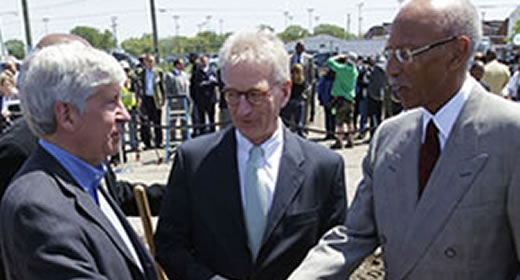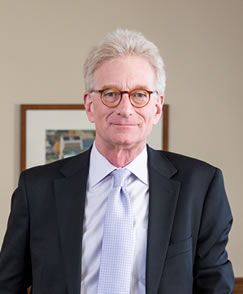
Detroiters spend an estimated $4.6 billion each year on groceries and other merchandise. And more than $1.5 billion of those retail dollars are spent outside of the city.
That's about to change: in May 2012 Michigan-based retailer Meijer broke ground on the first of two planned locations. The first location will anchor the forthcoming Gateway Marketplace on the city's west side with a supercenter—a combination grocery and department store format employed by other retailers but originated by Meijer in 1962.
The Gateway store will be the first Meijer to open its doors in Detroit.
The project spent several years in development, and the developer reportedly received millions in tax incentives—a point of contention among the city's independent grocers.
Yet according to Olga Stella (MPP '99), vice president of business development at the Detroit Economic Growth Corporation, conventional financing for Detroit-based real estate development is hard to come by.
"As a result," she explains, "large projects such as Meijer are very complicated to put together. And the development process can be confusing to the public because the complexity of each project has to do with the size of the [financing] gap."
Public sector involvement can make the difference in whether a real estate project—of any size—can move forward.
 |
|
Hank Meijer (AB '73) |
Recently Hank Meijer (AB '73), CEO and co-chairman of Meijer, Inc., sat down with State & Hill. Son of former CEO Frederik Meijer, who died in 2011, Meijer talked about the new store, Detroit-specific challenges, and his hopes for participating in the city's revitalization.
What makes this the right time for a Meijer store in Detroit? I think it's a combination of both the city being receptive and our company being ready. That means the resurgence we're beginning to see and the new optimism we're beginning to see about the future of Detroit. It also means our company being willing to move out of its comfort zone and understand better how to tailor a store to a community. That's a challenge we have: big city versus small town ethnically, demographically, and understanding how to localize a store that serves the mass population. And we need to get better at that. The ultimate timing was a three-part project, in a sense, with the city and the developer and ourselves all coming together. Finally, this year the stars aligned, and we were able to move ahead.
What can Meijer bring to the city's future? At a very basic level, people talk about the challenges in central cities with a lack of food choices. Well, there really are quite a few food choices in Detroit. I think you can overstate that case, but it really goes way beyond food choices. An awful lot of Detroiters don't have opportunities and alternatives to shop in the city. So we don't see it as only food at all, which is why we're building one of our larger format stores, about 190,000 square feet. If we can provide people with a good value on the widest possible selection of products, that's the most fundamental service we can offer. We don't want to be in the community unless we're going to be good citizens of that community.
Local grocers fear that Meijer will have a detrimental impact on independent options in the area. Thoughts? Well, certainly in every other community we're in, there are independent grocers. So like all competition, it presents a challenge that you have to rise to—just as we had to when Target and Walmart came to town. You can't have development and choice and innovation and all the things that we think are important for a vibrant city if you say no to new options. People want choices. And because we think we offer, in this case, a really good choice, our best competitors will do just fine. It's a challenge, but I think it's a challenge we all wrestle with in a competitive system.
Speaking of competition, Meijer invented the supercenter retail model now used by your competitors. How does that model evolve or adapt in Detroit, especially considering public transit challenges? When we started, my dad and my grandfather called it a self-service discount department store. It wasn't until Walmart came along and called them supercenters that we said, 'Oh, I guess that's what we're doing!' (laughs)
[The model] better evolve if it needs to. One of the concerns is that our business model is, unquestionably, geared toward a customer with a car, who can buy a large order of groceries, or whatever it might be, and has a trunk to put them in or a backseat to put them in. Do enough people have access to transportation to buy the things we sell? That's a big question that we hope and expect will be answered with this store.
Maybe the bus system will evolve, too. I sure hope it will. In fact, in a lot of the cities we're in, [customers have access to] public transportation—a bus stop. We have shelters on our parking lots and encourage bus transportation.
Will the forthcoming Whole Foods be an issue, or is that like comparing apples and oranges? (smiles) Well, we would like to think that we both do a great job with apples and oranges. Our goal—and we hope it's a business model that has a future—is to serve everyone. Historically, Whole Foods has served a more affluent demographic. They do a beautiful job at that, but it's a more limited audience.
Recent press mentions the Meijer 'Midwestern Strategy,' which sounds both geographical and philosophical. I'd like to think it is. It reflects a couple of things, and one is the simple business factor that we rely heavily on our own distribution network. It also reflects that we're privately held. So that meant we were going to grow more slowly than a bigger public company might. It also meant we were going to be content with Midwest geography. Beyond that, I'd say it would be nice to think that there is a set of Midwestern values. I don't know how you define that, but to the extent that there's something a little more authentic, maybe a little less flashy, a little more practical, we hope and feel like that's part of our culture.
Meet Hank Meijer
Hendrik (Hank) Meijer (AB '73) is a member of the Ford School Committee, a group of public and private sector volunteer leaders who help the school develop new initiatives to further education, research, and service in public policy.
Beginning with Frederik Meijer, the Meijer family has a thirty-year legacy of giving across the University of Michigan, including capital projects, research, and student support. Such commitment is keenly felt in Weill Hall, where the Meijer Family Faculty and Staff Lounge is a hub of activity and where graduate students benefit from Meijer Fellowships. "There's a real sense of new excitement here," Meijer explains. "With the combination of the dean's initiatives and the physical setting, there's a real energy at the Ford School that just, I think, typifies the best part of the University."
Top Photo: AP Photo / Carlos Osorio
Below is a formatted version of this article from State & Hill, the magazine of the Ford School. View the entire Fall 2012 State & Hill here.